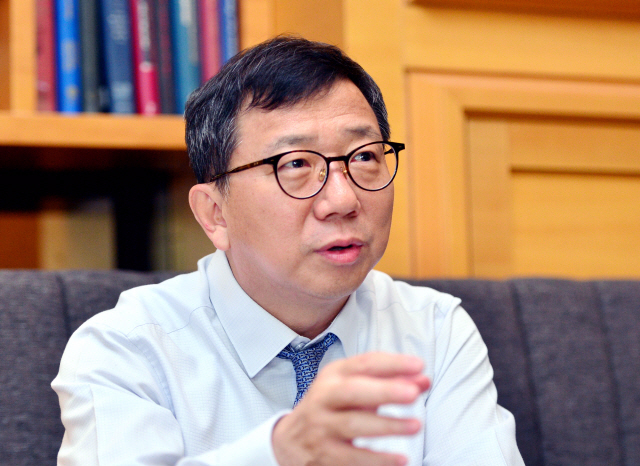[Anniversay Special] ‘Human rights, free trade key to overcoming diplomatic row with Japan’
By Park Han-naPublished : Aug. 14, 2019 - 14:04
South Korea should target Japan’s “abandonment” of the universal values of human rights and free trade to resolve their escalating dispute, according to professor of Japanese studies Lee Won-deog.
Meanwhile, he said, a tit-for-tat response to its retaliatory export restrictions is not a wise strategy.
“Given the asymmetry of their economies, a more effective way of pressing Japan is to take actions that follow the universal values or norms,” Lee, a professor at Kookmin University, told The Korea Herald during a recent interview in Seoul.
Japan recently implemented measures that could hurt the Korean economy, including export curbs on key materials used in the production of chips and display panels.
Meanwhile, he said, a tit-for-tat response to its retaliatory export restrictions is not a wise strategy.
“Given the asymmetry of their economies, a more effective way of pressing Japan is to take actions that follow the universal values or norms,” Lee, a professor at Kookmin University, told The Korea Herald during a recent interview in Seoul.
Japan recently implemented measures that could hurt the Korean economy, including export curbs on key materials used in the production of chips and display panels.

“The trade restriction was imposed for the sake of Japan’s national interests and political goals. South Korea should stress fair and free trade instead of making similar export counter attacks,” Lee said.
“Japan is the country that has been benefitting most from fair and free trade and knows that it needs it to keep its economy going.”
The export restriction is clearly a retaliatory action in protest against Korea’s Supreme Court rulings last year that ordered Japanese companies to compensate forced labor victims, he said.
The rulings drew a strong rebuke from Japan, which believes the matter was settled under a 1965 treaty normalizing diplomatic ties between Seoul and Tokyo.
Japanese firms’ failure to comply with the court orders prompted the Korean victims to take legal steps to seize and liquidate the companies’ assets in Korea.
Therefore, the Korean government should focus on fundamental human rights to support its argument against Japan, which claims individual rights to seek compensation from the Japanese government were nullified under a 1965 treaty.
“Bringing free trade and human rights to the forefront would gain sympathy from some groups of Japanese people. Such solidarity could isolate and deal a blow to the administration of Japanese Prime Minister Shinzo Abe,” Lee said.
Japan has been criticized for its “unfair and inappropriate measures” that take a toll on both countries as well as the global economy. “However, we need a clear understanding of what the nature of this situation is and need to be cautious about how we respond to it,” Lee said.
Viewing the feud as a battle for technological hegemony between Korea and Japan would not help resolve the dispute, said Lee, who believes this is a diplomatic problem stemming from different interpretations of the bilateral treaty of 1965.
Lee also criticized the government’s Aug. 5 decision to spend 7.8 trillion won ($6.39 billion) to develop Korea’s materials, parts and equipment sectors in an effort to reduce reliance on Japan, calling it “inefficient” and “undermining the global value chain.”
Tokyo’s export curbs were an expression of discontent over Seoul’s inaction following the Supreme Court rulings despite the former’s requests for dialogue and calls for third-party arbitration to resolve the issue.
When Korea’s Foreign Ministry proposed to raise funds from both Korean and Japanese companies to compensate the wartime forced labor in June, Japan immediately rejected it. The proposal was “too late and too little” for Japan, Lee said.
Without the Korean government playing the role of mediator between the victims and the companies, the plan was “not practical,” given the complex nature of compensation procedures, including estimating the number of victims and the amount of payment that should be made.
“Japan’s measures have been a preliminary warning but if the Korean government further neglects the labor issue and allows legal procedures to liquidate the Japanese firms’ seized assets to compensate victims, it could bring about an economic war.”
The Moon Jae-in administration has emphasized that it has to respect the judiciary’s decision under the principle of separation of powers.
However, it is likely that Japan will not budge an inch because of concerns that compensating Korean victims for physical and psychological damage could reignite similar World War II issues with other countries like Taiwan.
In Lee’s opinion, the best solution is to demand Japan’s sincere apology for its illegal colonial occupation of the Korean Peninsula and wartime atrocities while completely giving up on financial compensation.
“A way to win over a person who doesn’t want to give is to decide not to receive from the person. Instead, Korea could tell Japan this. ‘Know your sins and reflect on them,’” he said.
In that case, the Korean government has to take responsibility for carrying out measures for the Korean victims of Japan’s colonial rule.
Amid heightened tensions, this option could be regarded as a defeat to the Korean people but it could also offer catharsis for them, as they would be able to maintain their dignity, Lee said.
A second option could be to take the case to the International Court of Justice.
One advantage is that the two sides could have a period of truce, as it normally takes three to four years for the court to announce a ruling. However, there is the risk of negative sentiment among people here if Korea loses the legal battle.
“I think we have a chance to win because the individual rights of the victims to seek compensation cannot be terminated by countries, not to mention a state-to-state treaty. Japanese courts and Japan’s Foreign Ministry have acknowledged that,” said Lee.
By Park Han-na (hnpark@heraldcorp.com)









![[From the Scene] Monks, Buddhists hail return of remains of Buddhas](http://res.heraldm.com/phpwas/restmb_idxmake.php?idx=644&simg=/content/image/2024/04/19/20240419050617_0.jpg&u=20240419175937)






![[From the Scene] Monks, Buddhists hail return of remains of Buddhas](http://res.heraldm.com/phpwas/restmb_idxmake.php?idx=652&simg=/content/image/2024/04/19/20240419050617_0.jpg&u=20240419175937)

![[KH Explains] Hyundai's full hybrid edge to pay off amid slow transition to pure EVs](http://res.heraldm.com/phpwas/restmb_idxmake.php?idx=652&simg=/content/image/2024/04/18/20240418050645_0.jpg&u=20240419100350)

![[Today’s K-pop] Illit drops debut single remix](http://res.heraldm.com/phpwas/restmb_idxmake.php?idx=642&simg=/content/image/2024/04/19/20240419050612_0.jpg&u=)